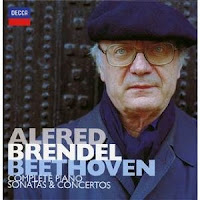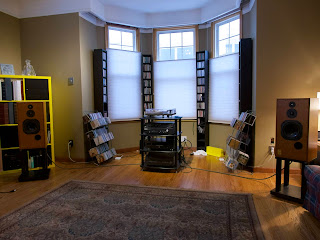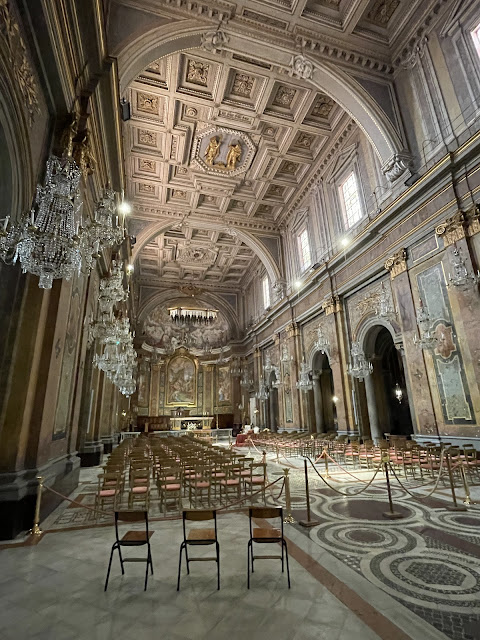Casting Pearls . . .
I passed a milestone recently -- in age, that is. Among the gifts I received was a gift certificate to a purveyor of media stuff, CD's, DVD's, Blue Rays, video games and the like. I went into the shop with the intention of purchasing a couple of movies. When I went to the relatively small classical music section, however, I couldn't believe my eyes. Boxed sets abounded. The prices were irresistible. People who know me think I have expensive taste. I will admit to liking nicely engineered things and I definitely do not like bad design. My priestly commitment hasn't so far required me to impose a regimen of aesthetic pollution or constant mechanical breakdown into my life. What some may not realize is my "cheap" side. I've always bought music with a view to how much it costs me per minute. That's why I still see downloads as being at a high price and a low quality. Some protocols, of course, are of quite good quality. It's just that you also have to bear the cost of storage and backup. Failing to do the latter can be quite costly. Classical downloads are also generally pretty expensive and even when they are not more expensive than the CD, they don't have the printed artwork, liner notes and so on that usually come with a decent CD.
 These boxed sets were from a couple of major labels. A lot of them are now corporately related anyway. What caught my eye is that the recordings involved were either well known or the featured artists or orchestras were of unassailably good quality. I bought the Mahler symphonies by Ricardo Chailly and the Royal Concertgebouw Orchestra of Amsterdam. The first nine are by Chailly and this orchestra in digital recordings. I bought a collection of the bulk of Puccini operas recorded mostly in the late 1950's and early 1960's. Beethoven piano works with Alfred Brendel and also another set with Vladimir Ashkenazy were also a great buy. All the Mozart symphonies on the Archiv label and Mozart's piano concertos also with Ashkenazy went to the checkout. I bought something like 50 discs altogether with each package only costing me between $25 and $35 dollars.
These boxed sets were from a couple of major labels. A lot of them are now corporately related anyway. What caught my eye is that the recordings involved were either well known or the featured artists or orchestras were of unassailably good quality. I bought the Mahler symphonies by Ricardo Chailly and the Royal Concertgebouw Orchestra of Amsterdam. The first nine are by Chailly and this orchestra in digital recordings. I bought a collection of the bulk of Puccini operas recorded mostly in the late 1950's and early 1960's. Beethoven piano works with Alfred Brendel and also another set with Vladimir Ashkenazy were also a great buy. All the Mozart symphonies on the Archiv label and Mozart's piano concertos also with Ashkenazy went to the checkout. I bought something like 50 discs altogether with each package only costing me between $25 and $35 dollars.
 On the one hand this was a tremendous opportunity to strengthen parts of my collection. I also can't imagine the time involved if I had to download all this material. It is wonderful in some ways to see major labels giving access to high quality music at a very reasonable price. The other side of this question though raises concerns. If this is the way that the labels are now able to make money what is the future of high quality recordings of current and future classical artists and orchestras? Some orchestras are releasing in-house recordings. One critic I read recently wondered about whether this might lead to mediocre material. The labels are in touch with what kinds of recordings people actually want to buy and listen to. Judging by our own local orchestra in Toronto, I'm not altogether sure they have a grip on the pulse of the potential purchasers of their recordings. One thing is that those who have the time, money and inclination to go to concerts do not always overlap with those who might be interested in listening at home or on their portable device. And those who do go to the concerts may well already possess one or several recordings of the piece they have just heard. Maybe there is a push here to orchestras to think a little more about music-making, performance, and, dare I say, entertainment. Even high brow music is human after all.
On the one hand this was a tremendous opportunity to strengthen parts of my collection. I also can't imagine the time involved if I had to download all this material. It is wonderful in some ways to see major labels giving access to high quality music at a very reasonable price. The other side of this question though raises concerns. If this is the way that the labels are now able to make money what is the future of high quality recordings of current and future classical artists and orchestras? Some orchestras are releasing in-house recordings. One critic I read recently wondered about whether this might lead to mediocre material. The labels are in touch with what kinds of recordings people actually want to buy and listen to. Judging by our own local orchestra in Toronto, I'm not altogether sure they have a grip on the pulse of the potential purchasers of their recordings. One thing is that those who have the time, money and inclination to go to concerts do not always overlap with those who might be interested in listening at home or on their portable device. And those who do go to the concerts may well already possess one or several recordings of the piece they have just heard. Maybe there is a push here to orchestras to think a little more about music-making, performance, and, dare I say, entertainment. Even high brow music is human after all.
The cost of making a good classical recording is high and a bit like Formula 1 racing, it has an effect in other parts of the industry. The improved clarity and dynamics of recordings have been driven by the acoustic demands of unamplified instruments. Less of this going on will have some effect on technical developments in sound recording.
The modern internet-based world has allowed self-publishing even like this blog to be something that anyone can pursue and yet we also want to differentiate ourselves. Instead the complexity of the chatter seems just to increase. What makes a person a great musician is of course talent and practice and the chance to listen to others who have achieved a high level of musicianship.
We need to continue to remaster old recordings and to nurture and develop new ones including evolving some way to ensure that our ears and those of a new generation of great musicians have the chance to be treated to sounds that truly inspire.
 These boxed sets were from a couple of major labels. A lot of them are now corporately related anyway. What caught my eye is that the recordings involved were either well known or the featured artists or orchestras were of unassailably good quality. I bought the Mahler symphonies by Ricardo Chailly and the Royal Concertgebouw Orchestra of Amsterdam. The first nine are by Chailly and this orchestra in digital recordings. I bought a collection of the bulk of Puccini operas recorded mostly in the late 1950's and early 1960's. Beethoven piano works with Alfred Brendel and also another set with Vladimir Ashkenazy were also a great buy. All the Mozart symphonies on the Archiv label and Mozart's piano concertos also with Ashkenazy went to the checkout. I bought something like 50 discs altogether with each package only costing me between $25 and $35 dollars.
These boxed sets were from a couple of major labels. A lot of them are now corporately related anyway. What caught my eye is that the recordings involved were either well known or the featured artists or orchestras were of unassailably good quality. I bought the Mahler symphonies by Ricardo Chailly and the Royal Concertgebouw Orchestra of Amsterdam. The first nine are by Chailly and this orchestra in digital recordings. I bought a collection of the bulk of Puccini operas recorded mostly in the late 1950's and early 1960's. Beethoven piano works with Alfred Brendel and also another set with Vladimir Ashkenazy were also a great buy. All the Mozart symphonies on the Archiv label and Mozart's piano concertos also with Ashkenazy went to the checkout. I bought something like 50 discs altogether with each package only costing me between $25 and $35 dollars. On the one hand this was a tremendous opportunity to strengthen parts of my collection. I also can't imagine the time involved if I had to download all this material. It is wonderful in some ways to see major labels giving access to high quality music at a very reasonable price. The other side of this question though raises concerns. If this is the way that the labels are now able to make money what is the future of high quality recordings of current and future classical artists and orchestras? Some orchestras are releasing in-house recordings. One critic I read recently wondered about whether this might lead to mediocre material. The labels are in touch with what kinds of recordings people actually want to buy and listen to. Judging by our own local orchestra in Toronto, I'm not altogether sure they have a grip on the pulse of the potential purchasers of their recordings. One thing is that those who have the time, money and inclination to go to concerts do not always overlap with those who might be interested in listening at home or on their portable device. And those who do go to the concerts may well already possess one or several recordings of the piece they have just heard. Maybe there is a push here to orchestras to think a little more about music-making, performance, and, dare I say, entertainment. Even high brow music is human after all.
On the one hand this was a tremendous opportunity to strengthen parts of my collection. I also can't imagine the time involved if I had to download all this material. It is wonderful in some ways to see major labels giving access to high quality music at a very reasonable price. The other side of this question though raises concerns. If this is the way that the labels are now able to make money what is the future of high quality recordings of current and future classical artists and orchestras? Some orchestras are releasing in-house recordings. One critic I read recently wondered about whether this might lead to mediocre material. The labels are in touch with what kinds of recordings people actually want to buy and listen to. Judging by our own local orchestra in Toronto, I'm not altogether sure they have a grip on the pulse of the potential purchasers of their recordings. One thing is that those who have the time, money and inclination to go to concerts do not always overlap with those who might be interested in listening at home or on their portable device. And those who do go to the concerts may well already possess one or several recordings of the piece they have just heard. Maybe there is a push here to orchestras to think a little more about music-making, performance, and, dare I say, entertainment. Even high brow music is human after all. The cost of making a good classical recording is high and a bit like Formula 1 racing, it has an effect in other parts of the industry. The improved clarity and dynamics of recordings have been driven by the acoustic demands of unamplified instruments. Less of this going on will have some effect on technical developments in sound recording.
The modern internet-based world has allowed self-publishing even like this blog to be something that anyone can pursue and yet we also want to differentiate ourselves. Instead the complexity of the chatter seems just to increase. What makes a person a great musician is of course talent and practice and the chance to listen to others who have achieved a high level of musicianship.
We need to continue to remaster old recordings and to nurture and develop new ones including evolving some way to ensure that our ears and those of a new generation of great musicians have the chance to be treated to sounds that truly inspire.

